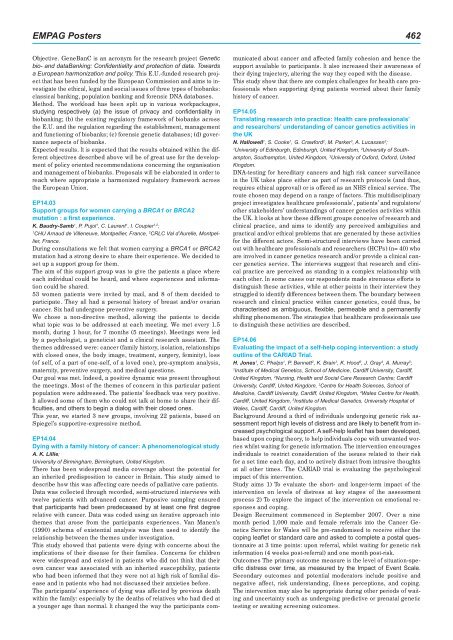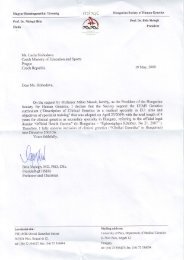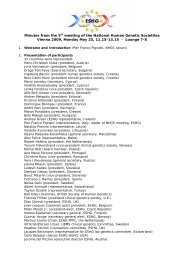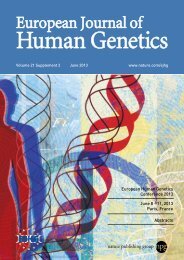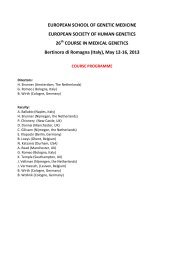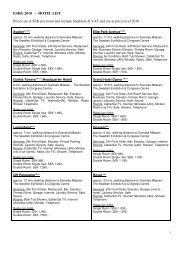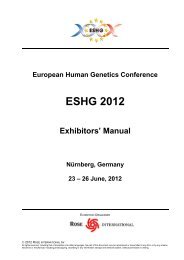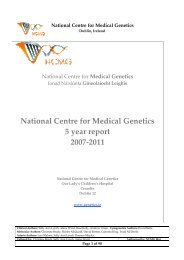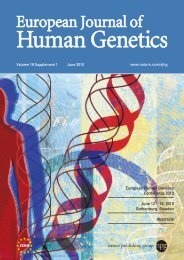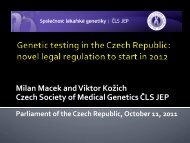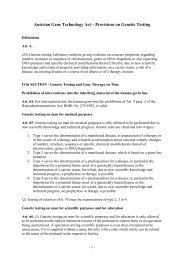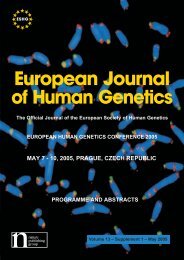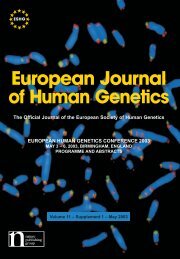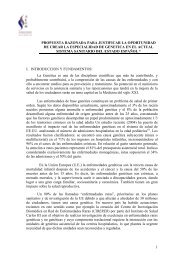2008 Barcelona - European Society of Human Genetics
2008 Barcelona - European Society of Human Genetics
2008 Barcelona - European Society of Human Genetics
Create successful ePaper yourself
Turn your PDF publications into a flip-book with our unique Google optimized e-Paper software.
EMPAG Posters<br />
Objective . GeneBanC is an acronym for the research project Genetic<br />
bio- and dataBanking: Confidentiality and protection <strong>of</strong> data. Towards<br />
a <strong>European</strong> harmonization and policy. This E .U .-funded research project<br />
that has been funded by the <strong>European</strong> Commission and aims to investigate<br />
the ethical, legal and social issues <strong>of</strong> three types <strong>of</strong> biobanks:<br />
classical banking, population banking and forensic DNA databases .<br />
Method . The workload has been split up in various workpackages,<br />
studying respectively (a) the issue <strong>of</strong> privacy and confidentiality in<br />
biobanking; (b) the existing regulatory framework <strong>of</strong> biobanks across<br />
the E .U . and the regulation regarding the establishment, management<br />
and functioning <strong>of</strong> biobanks; (c) forensic genetic databases; (d) governance<br />
aspects <strong>of</strong> biobanks .<br />
Expected results . It is expected that the results obtained within the different<br />
objectives described above will be <strong>of</strong> great use for the development<br />
<strong>of</strong> policy oriented recommendations concerning the organisation<br />
and management <strong>of</strong> biobanks . Proposals will be elaborated in order to<br />
reach where appropriate a harmonized regulatory framework across<br />
the <strong>European</strong> Union .<br />
EP14.03<br />
support groups for women carrying a BRCA or BRCA<br />
mutation : a first experience.<br />
K. Baudry-Samb1 , P. Pujol1 , C. Laurent1 , I. Coupier1,2 ;<br />
1 2 CHU Arnaud de Villeneuve, Montpellier, France, CRLC Val d’Aurelle, Montpellier,<br />
France.<br />
During consultations we felt that women carrying a BRCA1 or BRCA2<br />
mutation had a strong desire to share their experience . We decided to<br />
set up a support group for them .<br />
The aim <strong>of</strong> this support group was to give the patients a place where<br />
each individual could be heard, and where experiences and information<br />
could be shared .<br />
53 women patients were invited by mail, and 8 <strong>of</strong> them decided to<br />
participate . They all had a personal history <strong>of</strong> breast and/or ovarian<br />
cancer . Six had undergone preventive surgery .<br />
We chose a non-directive method, allowing the patients to decide<br />
what topic was to be addressed at each meeting . We met every 1 .5<br />
month, during 1 hour, for 7 months (5 meetings) . Meetings were led<br />
by a psychologist, a geneticist and a clinical research assistant . The<br />
themes addressed were: cancer (family history, isolation, relationships<br />
with closed ones, the body image, treatment, surgery, feminity), loss<br />
(<strong>of</strong> self, <strong>of</strong> a part <strong>of</strong> one-self, <strong>of</strong> a loved one), pre-symptom analysis,<br />
maternity, preventive surgery, and medical questions .<br />
Our goal was met . Indeed, a positive dynamic was present throughout<br />
the meetings . Most <strong>of</strong> the themes <strong>of</strong> concern in this particular patient<br />
population were addressed . The patients’ feedback was very positive .<br />
It allowed some <strong>of</strong> them who could not talk at home to share their difficulties,<br />
and others to begin a dialog with their closed ones.<br />
This year, we started 3 new groups, involving 22 patients, based on<br />
Spiegel’s supportive-expressive method .<br />
EP14.04<br />
Dying with a family history <strong>of</strong> cancer: A phenomenological study<br />
A. K. Lillie;<br />
University <strong>of</strong> Birmingham, Birmingham, United Kingdom.<br />
There has been widespread media coverage about the potential for<br />
an inherited predisposition to cancer in Britain . This study aimed to<br />
describe how this was affecting care needs <strong>of</strong> palliative care patients .<br />
Data was collected through recorded, semi-structured interviews with<br />
twelve patients with advanced cancer . Purposive sampling ensured<br />
that participants had been predeceased by at least one first degree<br />
relative with cancer . Data was coded using an iterative approach into<br />
themes that arose from the participants experiences . Van Manen’s<br />
(1990) schema <strong>of</strong> existential analysis was then used to identify the<br />
relationship between the themes under investigation .<br />
This study showed that patients were dying with concerns about the<br />
implications <strong>of</strong> their disease for their families . Concerns for children<br />
were widespread and existed in patients who did not think that their<br />
own cancer was associated with an inherited susceptibility, patients<br />
who had been informed that they were not at high risk <strong>of</strong> familial disease<br />
and in patients who had not discussed their anxieties before .<br />
The participants’ experience <strong>of</strong> dying was affected by previous death<br />
within the family: especially by the deaths <strong>of</strong> relatives who had died at<br />
a younger age than normal . It changed the way the participants com-<br />
municated about cancer and affected family cohesion and hence the<br />
support available to participants . It also increased their awareness <strong>of</strong><br />
their dying trajectory, altering the way they coped with the disease .<br />
This study show that there are complex challenges for health care pr<strong>of</strong>essionals<br />
when supporting dying patients worried about their family<br />
history <strong>of</strong> cancer .<br />
EP14.05<br />
translating research into practice: Health care pr<strong>of</strong>essionals’<br />
and researchers’ understanding <strong>of</strong> cancer genetics activities in<br />
the UK<br />
N. Hallowell 1 , S. Cooke 1 , G. Crawford 2 , M. Parker 3 , A. Lucassen 2 ;<br />
1 University <strong>of</strong> Edinburgh, Edinburgh, United Kingdom, 2 University <strong>of</strong> Southampton,<br />
Southampton, United Kingdom, 3 University <strong>of</strong> Oxford, Oxford, United<br />
Kingdom.<br />
DNA-testing for hereditary cancers and high risk cancer surveillance<br />
in the UK takes place either as part <strong>of</strong> research protocols (and thus,<br />
requires ethical approval) or is <strong>of</strong>fered as an NHS clinical service . The<br />
route chosen may depend on a range <strong>of</strong> factors . This multidisciplinary<br />
project investigates healthcare pr<strong>of</strong>essionals’, patients’ and regulators/<br />
other stakeholders’ understandings <strong>of</strong> cancer genetics activities within<br />
the UK . It looks at how these different groups conceive <strong>of</strong> research and<br />
clinical practice, and aims to identify any perceived ambiguities and<br />
practical and/or ethical problems that are generated by these activities<br />
for the different actors . Semi-structured interviews have been carried<br />
out with healthcare pr<strong>of</strong>essionals and researchers (HCPs) (n= 40) who<br />
are involved in cancer genetics research and/or provide a clinical cancer<br />
genetics service . The interviews suggest that research and clinical<br />
practice are perceived as standing in a complex relationship with<br />
each other . In some cases our respondents made strenuous efforts to<br />
distinguish these activities, while at other points in their interview they<br />
struggled to identify differences between them . The boundary between<br />
research and clinical practice within cancer genetics, could thus, be<br />
characterised as ambiguous, flexible, permeable and a permanently<br />
shifting phenomenon . The strategies that healthcare pr<strong>of</strong>essionals use<br />
to distinguish these activities are described .<br />
EP14.06<br />
Evaluating the impact <strong>of</strong> a self-help coping intervention: a study<br />
outline <strong>of</strong> the cARiAD trial.<br />
H. Jones 1 , C. Phelps 1 , P. Bennett 2 , K. Brain 1 , K. Hood 3 , J. Gray 4 , A. Murray 5 ;<br />
1 Institute <strong>of</strong> Medical <strong>Genetics</strong>, School <strong>of</strong> Medicine, Cardiff University, Cardiff,<br />
United Kingdom, 2 Nursing, Health and Social Care Research Centre; Cardiff<br />
University, Cardiff, United Kingdom, 3 Centre for Health Sciences, School <strong>of</strong><br />
Medicine, Cardiff University, Cardiff, United Kingdom, 4 Wales Centre for Health,<br />
Cardiff, United Kingdom, 5 Institute <strong>of</strong> Medical <strong>Genetics</strong>, University Hospital <strong>of</strong><br />
Wales, Cardiff, Cardiff, United Kingdom.<br />
Background Around a third <strong>of</strong> individuals undergoing genetic risk assessment<br />
report high levels <strong>of</strong> distress and are likely to benefit from increased<br />
psychological support. A self-help leaflet has been developed,<br />
based upon coping theory, to help individuals cope with unwanted worries<br />
whilst waiting for genetic information . The intervention encourages<br />
individuals to restrict consideration <strong>of</strong> the issues related to their risk<br />
for a set time each day, and to actively distract from intrusive thoughts<br />
at all other times . The CARIAD trial is evaluating the psychological<br />
impact <strong>of</strong> this intervention .<br />
Study aims 1) To evaluate the short- and longer-term impact <strong>of</strong> the<br />
intervention on levels <strong>of</strong> distress at key stages <strong>of</strong> the assessment<br />
process 2) To explore the impact <strong>of</strong> the intervention on emotional responses<br />
and coping .<br />
Design Recruitment commenced in September 2007 . Over a nine<br />
month period 1,000 male and female referrals into the Cancer <strong>Genetics</strong><br />
Service for Wales will be pre-randomised to receive either the<br />
coping leaflet or standard care and asked to complete a postal questionnaire<br />
at 3 time points: upon referral, whilst waiting for genetic risk<br />
information (4 weeks post-referral) and one month post-risk .<br />
Outcomes The primary outcome measure is the level <strong>of</strong> situation-specific<br />
distress over time, as measured by the Impact <strong>of</strong> Event Scale.<br />
Secondary outcomes and potential moderators include positive and<br />
negative affect, risk understanding, illness perceptions, and coping .<br />
The intervention may also be appropriate during other periods <strong>of</strong> waiting<br />
and uncertainty such as undergoing predictive or prenatal genetic<br />
testing or awaiting screening outcomes .


